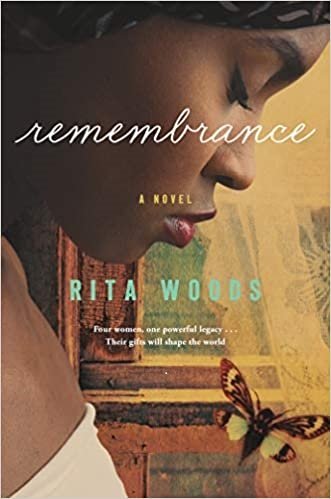I first met Rita Woods through her beautiful novel, Remembrance, and then in person at my favorite book festival, Bookmarks, in Winston-Salem, NC. Rita quickly became one of my favorite writing friends for her dry wit and insightful views, plus the moving and compelling storytelling I already knew. (Her 2nd novel, The Last Dreamwalker, is coming out this September!) Rita is a busy woman, as she’s also a physician and director of a wellness center, so I was delighted to get to spend a little time with her chatting about books.
What are some good books about women’s history that you’ve read recently?
So many great books. I’m finishing When Two Feathers Fell from the Sky by Margeret Verble, Sisters in Arms by Kaia Anderson and waiting patiently for By Her Own Design by Piper Hughley which releases in June (about Ann Lowe, the Black woman who designed Jackie Kennedy’s wedding dress)
I enjoyed Sisters in Arms too — it’s one where the characters come back to me often. And I’m not so patient as I wait for By Her Own Design to show up on my doorstep! Those two novels are about WWII or later 20th century history, but much of your writing takes place earlier. What era do you think Americans should learn more about?
I think the era between the World Wars is absolutely fascinating. The entire European map was redrawn, monarchies toppled, democracies created, Industrialization exploded (think Henry Ford’s assembly line), massive worldwide migration, racial chaos (The Red Summer of 1919), followed by global economic collapse. The material and information from this period is nearly endless and also informs much of what continues to inform present day (Russia/Ukraine, Redlining and housing discrimination, current social service systems, medical systems).
You’re right, history informs our present, but we often lose sight of that. Can you tell us what one of your characters would say about today’s historical moment?
Gemma in The Last Dreamwalker held so much disdain for the world outside of her small Gullah island. She would say that what is happening in the world is what has always happened and what will ALWAYS happen. Folks fighting for this bit of land, that bit of water. And most of the time not having anything to do with poor people and people of color. She would say: We just mind our business and live our life out here on this island and let them fight it out.
Was there anything in your research that surprised you?
In my current research about 1920’s Detroit, I was surprised (and dismayed) to discover that Michigan was a hotbed of the Klan. That a Klan member actually ran (successfully) for mayor and was only removed because of financial irregularities. That a wall that ran along a street where I grew up and which I had always assumed to be decorative (if I thought of it at all) was in fact erected as a racial barrier in the 30’s and 40’s. And finally, that I went to high school with the descendants of some of the most influential/controversial political figures of the 20’s and 30’s.
The past isn’t even past, is it? Thank you, Rita!

















![[Alternate text: The fox version of Robin Hood aims a bow, albeit a recurve bow, to his right.]](https://images.squarespace-cdn.com/content/v1/5747922eb09f954951de57ed/1567990680749-8OY5MCZFIWM1F3WC28QF/Robin+Hood+fox.png)



